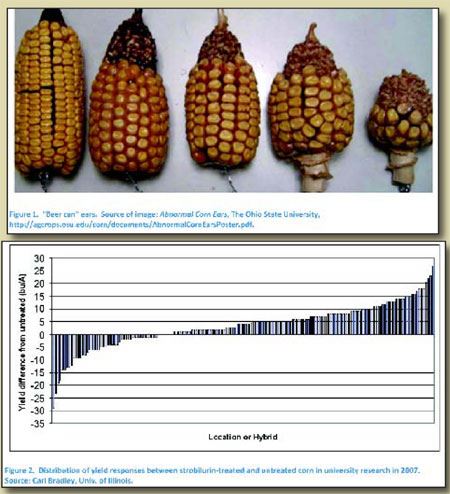Pretassel Applications Of Strobilurin Fungicides Can Cause ‘Beer Can’ Ears
DR. DON HERSHMAN
LEXINGTON, KY.
PRINCETON, KY.
Corn ears with the markedly reduced ear
size shown in Figure 1 go by several
names: “beer can” ears, blunt ear syndrome,
ear stunting, and arrested ear syndrome.
The length of the husk and number of
kernel rows are often normal, but the number
of kernels per row is often greatly reduced.
Cold shock while corn is in the V8-V12 stage
is thought to be one possible cause, but the
pretassel application of certain strobilurin
fungicides can also cause such symptoms. Literature
from BASF, the manufacturer of Headline
®, indicates that this has been seen only
0.25 percent of treated fields. This literature
also indicates that the problem has only been
associated with applications which included an
adjuvant such as a nonionic surfactant.
BASF’s recommendation for Headline® is as
follows:
1. Pre-tassel application. Product may be applied
by ground rig but without an adjuvant. If
applying by aerial application, apply in at least
5 gal/acre and without an adjuvant. Do not
apply Headline® in less than 5 gal/acre.
2. VT through R2 application. Product may
be applied aerially in at least 5 gal/acre or by
ground rig; the use of an adjuvant is flexible. If
applying aerially in less than 5 gal/acre, include
crop oil in spray.

Although this specific syndrome has only
been associated with fungicide application in
less than 1 percent of treated fields, it is important
to note that yield loss was frequently
associated with application of strobilurin
fungicides in tests conducted in 2007 by university
researchers (Figure 2). We don’t fully
understand all the reasons these yield losses
occur. Some of these may be explained by natural
variation (random chance), but then again,
natural variation may also explain some of the
yield increases that occur. In any case, the possibility
of yield loss is something to be aware of
when considering the use of strobilurin fungicides
on corn. Δ
Dr. Paul Vincelli is Extension Plant Pathologist
with the University of Kentucky at Lexington and
Dr. Don Hershman is Extension Plant Pathologist
with the University of Kentucky at Princeton.